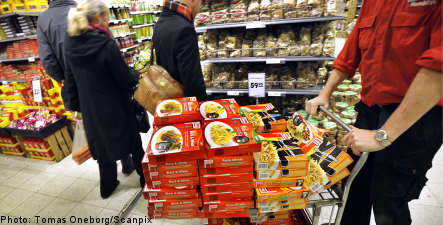On Monday, Swedish food company Findus announced it was recalling a host of its products containing Irish pork.
Wholesaler Servera, a major distributor of Findus products, in turn reviewed its list of nearly 20,000 clients only to discover that several schools may be among those that received deliveries.
“We’ve identified 152 customers. It can be to schools, nursing homes, or hospitals. It’s only a fraction of our customers,” said Servera purchasing manager Nils Berntsson to the TT news agency.
Specifically, Servera is tracking 726 packages of “Biff Lindström” and Swedish meatballs.
Servera’s Berntsson didn’t know how many of the packages may have already been consumed by Swedish school children or hospital patients.
“We’re going to be getting in touch with all of our clients within the next several hours. Obviously, we think this it’s terrible to be in this situation and for our customers have been put in a difficult position, but unfortunately it’s out of our control,” he said.
Louise Nyholm, an inspector with Sweden’s National Food Administration (Livsmedelsverket) can’t rule out that the tainted meat has already been eaten.
“We can’t say that with certainly that that is not the case,” she told TT.
“We don’t really know how widespread it is, so right now I can’t say [how much meat is involved]. We have our toxicologists involved in this and after we know more we can estimate how it might affect the population.”
So far, Findus has been hardest hit by the Irish pork warning, being forced to recall several products from store shelves and commercial distributors throughout Sweden on Monday.
On Tuesday, the European Union’s food safety body, EFSA, was brought in to investigate the scope of the impact caused by the contaminated Irish pork.
The EFSA is currently conducting a risk assessment and is expected to issue a statement on Wednesday as to whether any additional measures will be necessary.
The pork recall comes following the discovery of the cancer-causing agent dioxin in various samples of Irish meat tested in France.
Irish authorities later traced the dioxin to poisoned feed consumed by pigs on several farms in Ireland.
While dioxin is known to cause cancer, the Food Administration’s Nyholm stressed that people who may have consumed meat containing the toxin need not be too worried.
“Dioxin is a toxin which isn’t healthy for us. Therefore we should limit the amount we ingest. But if you consume it on one particular occasion, it’s not dangerous,” she said.
“There’s no acute toxic effect but rather it something which could be dangerous if it accumulates over a long period of time.”



 Please whitelist us to continue reading.
Please whitelist us to continue reading.